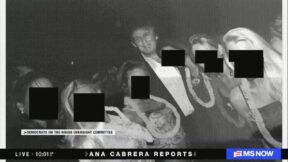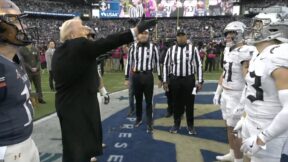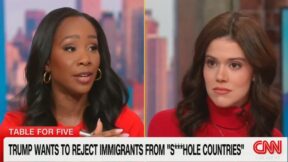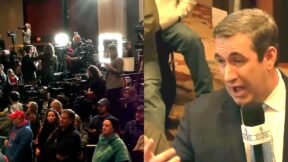‘A Fantastic Legacy’: Inside the Life and Career of Kobe Bryant, From Those in the Media Who Knew Him Best
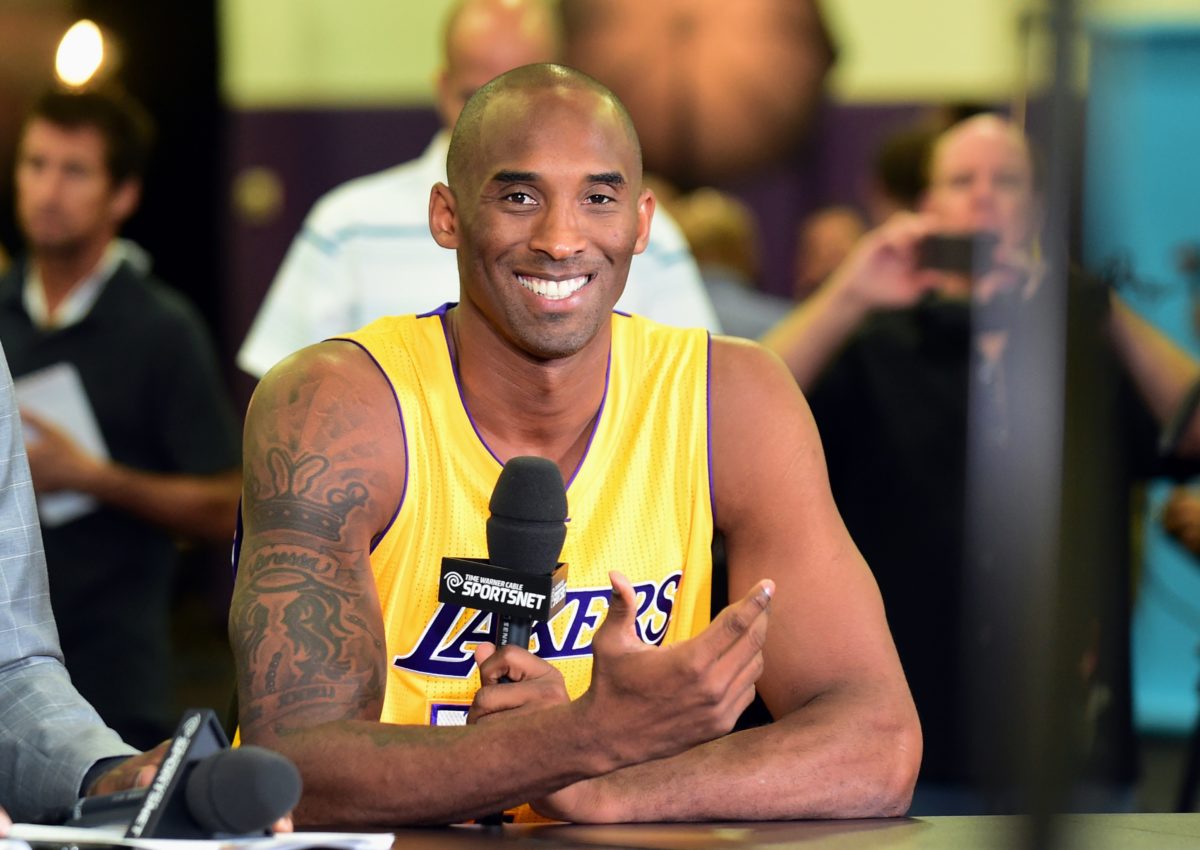
FREDERIC J. BROWN/AFP
The narrative surrounding Kobe Bryant has fluctuated since the future NBA Hall of Famer entered the spotlight as a teenager.
A high school phenom turned NBA star that won three-straight championships had his reputation tarnished amidst rape allegations in 2003. His identity shifted toward a self-dubbed nickname, “The Black Mamba,” a quiet, sometimes self-centered generational basketball talent that would go on to win more titles and more accolades. By 2010, when he helped the Lakers win their fifth NBA championship in 11 years, Bryant had a legion of fans cheering his every move on the court. Retirement in 2016 drove him to become a renowned ambassador for both the women’s and men’s games, something he continued the rest of his life. And he’d even added an Oscar to his resume.
On Sunday, the world reflected on all sides of Kobe Bryant, who tragically died along with eight other people, including his 13-year-old daughter Gianna, in a helicopter crash. He was the father of four children and the son of Joe Bryant, an eight-year NBA veteran.
The week following his death, members of the media have shared their stories of laughing, arguing, praising, and interacting with Bryant. Some were on-air, like Jay Williams’ raw tribute on SportsCenter. Other’s emotions were expressed in columns, likeBill Plaschke’s reaction as he described his relationship with Bryant throughout both of their careers.
Mediaite spoke with some who knew the 20-year NBA veteran best, as they recounted and mourned the life of Kobe Bryant from the moment he stepped into stardom. Interviews have been edited for space and clarity.
Jeremy Treatman, founder of Scholastic Play-by-Play Classics and former Lower Merion assistant coach: I was coaching a Jewish day school boys basketball team called Akiba Hebrew Academy in Marion, Pennsylvania and Kobe’s family had just come back from Italy. Joe Bryant, his father, played his last eight years professionally in Italy and had just come home, and had briefly taken the girl head coaching job. We became instant friends and Kobe would come by a few times during and after practice and he would just be shooting around on the side basket while he was teaching these girls. I was teaching the boys. I was watching him practice and he’d dunk. He was very young, 13 at best. I just started asking questions about them.
I’m like, “Joe, is he anything close to what you are?”
He goes, “Are you kidding, he’s so much better than me at this age.”
I go, “Really, you were a superstar.”
And he says, “I’m telling you, I wasn’t anything close. He’s going to be great.”
Ian Eagle, veteran sports announcer: Because the first name was so unique, you remembered it. It stood out. It resonated in some way.
Treatman: We had a practice that got cancelled one day. They over-scheduled, so the girls got the gym and 14 kids ran out of the gym high-fiving each other, so happy there’s no practice. Kobe Bryant took a ball and he pegged it on the wall and was like, “This is ridiculous. This is crap. We need to practice. We’re trying to win a state championship.”
Mike Jensen, longtime basketball reporter for the Philadelphia Inquirer: He went up against Rip Hamilton, former Coatesville High School great, semifinals at The Palestra … and it was one of these classic matchups. The play that left my memory was this alley-oop backward dunk that he actually missed but was still such a spectacular play. It was like you gotta be kidding me.
Chris Mundy, former senior writer for Rolling Stone: His senior year in high school, it was a time where they were starting to show games on ESPN and all that. He was famous before he even hit the league. In one way, I thought he’s just this kid more than I ever expected. And in another way, he’s really kinda good at being famous.
Treatman: He asked [Lower Merion head] coach [Gregg] Downer if I could be his roommate. Probably because we were friends first before I became a coach and he knew like I wasn’t gonna take the fancy room — he got the fancy room and I got the couch and that’s okay. That’s okay. I’ll treasure those trips forever.
Dan Gross, former Philly Daily News columnist, in the Philadelphia Inquirer: Over the years, I’ve been happy to read about Kobe specifically citing Jeanne Mastriano, our 10th-grade English teacher, as a huge influence on him, because it was her sophomore class that we had together. Our class worked on a playwriting project with a class from Simon Gratz High and local theater professionals. Kobe was very comfortable performing. He worked as hard in that class as any other student despite knowing he didn’t have to, with the ability to go to any college he would have wanted to, or, as it turned out, straight into the NBA.
• • •
Kobe Bryant finished high school as the Naismith Prep Player of the Year in 1995 while also grabbing headlines in the process — some for his team’s success, others for taking Brandy to his prom. Out of Lower Merion, Bryant became the sixth player in NBA history to bypass college and declare for the NBA Draft.
Eagle: I had just completed my second year of broadcasting for the Nets — it’s now been 26 years — and I started hearing his name pop up for their first round draft pick. They had worked him out. The rumor was that they were blown away by his talent and there was a very high probability that they would take him with their first pick. It was John Calipari’s first year with the organization and ultimately they got cold feet.
J.A. Adande, former NBA columnist and ESPN host: I first crossed paths with Kobe on Nov. 5, 1996, when he played against the Knicks in Madison Square Garden. He was a teenager bursting with energy. I didn’t realize this until I just looked up the Lakers’ results from that season, but that was the night he scored his first point [singular, not plural; he made one free throw]. I had no idea he would score 33,642 more in his career.
Mundy: [After his first season], he seemed much more grown up just in that one year … You could tell the difference. He’d matured into the role.
Colby Hall, Mediaite founding editor and author of Kobe Bryant: People forget that Kobe’s first year was a bust, particularly after all the hype of a perimeter player skipping college and going straight to the pros. I think he averaged only seven points a game coming off the bench for the Lakers his rookie year. But 97-98 was his burst out year, and he even earned a starting spot on the West All-Star roster, making him the youngest player ever to play in an All Star game. Michael Jordan won MVP honors, but that game will forever be better known by NBA historians as Kobe’s break out game.
Eagle: In 2000, he came to the Meadowlands, the Lakers played the Nets. Stephon Marbury had the game of his life, scored 50 points. He had put the Nets on his back and he was in a dual with Kobe Bryant, and Kobe ended up making the big baskets down the stretch. Lakers won the game in overtime. After the game, Kobe Bryant was our guest on Nets Television and we relayed the rumor about him [before the 1996 NBA Draft] not wanting to play in New Jersey and asked him about it. He said, “No, I had no problem with playing in New Jersey. And if I was with the Nets, the Nets would’ve won the game tonight.”
Mundy: Shaq was the veteran and it was his team. He’s going to kinda put the kid in his place because he’s a rookie. There was no friction in that because the roles were so clear. As it progressed and Kobe’s game progressed, his position on that team and then that franchise progressed, I’m sure it became a more complicated brother-brother relationship.
Jensen: He’s one of the most complicated basketball figures the city [of Philadelphia] has ever produced — this love-hate relationship.
Michael Lee, senior NBA writer, in The Athletic: I had pitched a story to my editors on how Bryant was attempting to rehabilitate his image following the Shaq trade and his sexual assault case in Colorado by steering the conversation toward his high scoring games … When I showed up to the shoot around, I was stunned to find out that I was the only reporter in the arena. Now, remember, this was 2006, before social media and before there was this ridiculous thirst for endless soundbites and videos. I later learned that the Lakers beat writers had collectively agreed to ditch shoot arounds, which worked out well for me. Kobe was working out on his own, putting up shots for several minutes after teammates and others had left the arena. I told him I’d love to talk when he finished. He agreed to give me some time. We sat and talked for nearly 15 minutes about what he was hoping to accomplish that season, the history he was making, and he clearly wanted to get something off his chest.
Mark Medina, national NBA writer for USA Today and former Lakers beat writer: Kobe will be remembered for a lot of things because he had many layers, both good and bad. The good: Kobe’s on-court accomplishments, his ability to play through injuries, his work ethic, his intellectual curiosity, his willing mentoring to the current NBA generation, his support for women’s basketball, his devotion to his daughters, his training facility, his story-telling projects. The bad: Kobe’s maniacal approach sometimes turned off coaches and teammates, his dropped sexual assault charge case. Despite Bryant’s complexities, my sense is that the good will vastly outweigh the bad. The reason: Both parties agreed for his legal situation not to be taken up in court. As for Bryant’s demanding leadership style, there are other coaches and teammates that felt those qualities were necessary for both Bryant and the team to play at their best.
Bryant became the NBA’s most popular figure since Michael Jordan from his ability to take over games combined with multiple shoe deals and endorsements. He was either everyone’s favorite player or bigger enemy. The Lakers continued to dominate, this time under Bryant’s tutelage as Shaquille O’Neal was traded in 2004. The name “Kobe” resonated worldwide, the same way as the likes of “Beyonce” and “Bono.” His celebrity status increased as a result — for better or for worse — but Bryant, according to those who covered him during that time, knew how to handle it.
Jensen: After they won the gold medal [at the 2008 Olympics], I wanted to see if there’s a scene outside and the bus was pulling out and you know, all the interviews were over and all that. Deron [Williams] at Utah at that point, opened up the hatch at the top of the bus. He popped his head out and started chanting “USA.” The whole crowd, a big crowd this time, instead started chanting “KOBE,” KOBE” back at him.
Michael Eaves, SportsCenter anchor and former Lakers reporter: The 2008 Finals, Boston game six, and [the Lakers] got absolutely housed in a game. Boston just blew them out from the jump and it was not even close. And so after everything was done, ended up back at the team hotel there in Boston and Kobe and some of the guys were hanging out in the bar. A lot of people around the team were there and the bar was closed because it’s after 2 a.m., but they had set up Kobe and the guys with some drinks. It’s kinda somber because people are like “Damn, we just lost. We got blown out.” And Kobe’s sitting there.
I walk up and he goes, “Hey man, take some of this beer, I can’t drink all of this by myself.”
So I took a beer and I said, “How you doing man? You good?” And I thought he was going to be kinda mad and down.
He was upbeat like, “Oh man, I’m good. We gonna bust their ass next year.”
And that was like, that just kinda stood out to me … He just saw it as a stepping stone to getting back to winning those championships.
Olivia Stomski, former Fox Sports Net West producer: The one thing that was so interesting about Kobe was how serious he was when he went to work.
Eagle: Every interview he gave was interesting. He was incredibly thoughtful in his answers. He never just gave the same pat responses.
Treatman: When he was in 11th grade and I did his first Television interview, [I remember] how poised and smooth and articulate and intelligent he was. I don’t think stuttered once in the 35 minute sit down with him.
Adande: He was someone who produced great, compelling content. However you felt about it, he gave you so much material to argue your side. But he was always interesting.
Eaves: In front of cameras, he would filter a bit. But Kobe cursed like a sailor.
Stomski: We were doing a historical piece with the Lakers and we were comparing current players to past players. We wanted Kobe to do a behind-the-back pass so we could compare his ball distribution with Magic Johnson. As I’m explaining to him, “Kobe, this is what we’re gonna do. You’re gonna grab the ball and you’re going to pass the ball off screen so we have another player catch it,” he looked at me and he said, “I don’t pass the ball.” And he started to laugh with his teammates around him. Lamar Odom started laughing and said, “He’s right. He doesn’t pass the ball. You should find something else for him to do. Maybe he should just shoot.”
• • •
After 20 storied seasons with the Los Angeles Lakers, Kobe Bryant retired in 2016 as a five-time champion and the third-leading scorer in NBA history. He delved into showbiz, directing an animated short entitled “Dear Basketball,” which landed him an Oscar. And like most greats, Bryant started coaching — his daughter’s AAU team.
On Saturday, Jan. 25, 2020, he watched as LeBron James passed him on the NBA all-time scoring in the same uniform, making national headlines. Bryant was still in the news the next day, but under different circumstances.
Stomski: A former grad student texted me and said, “This story about Kobe!” I hadn’t heard anything, I’d been on a plane, went to my next gate, got on the next one. I thought she meant LeBron surpassing him in the record books. And I responded and said, “Do you mean LeBron story? The story is about LeBron, not Kobe.” And she said, “No, he died.” And I didn’t respond.
Mundy: I was driving up to my daughter’s game, her tournament she was in was five, six miles from the Mamba [Sports] Academy. In fact, her next tournament she has is at the Mamba Academy. She plays there a lot — it’s the same teams who play basketball a lot — and somebody texted me the news … It was kinda disbelief as we make our way to the tournament. It was odd like driving practically toward the site in a way.
Treatman: We’re planning a four o’clock announcement for a local girls player who’s ranked in the top five in the country … I wanted to do something special for this girl. And then about an hour earlier, I got the news through like 10 million texts and calls and I was like crying in the middle of a foyer with 500 people around me. I don’t know, I can’t remember who exactly I hugged or cried on or put a puddle on their shoulder, but I definitely had been crying and that this family saw me doing that. And they go, “You don’t have to worry about this announcement. We don’t need to do that.” I said, “No, we said we were doing this and we’re gonna do it.” That’s exactly what Kobe Bryant would’ve said.
Medina: I was at the cash register of a clothing store when a friend texted me about the news and asking if it was true. Moments later, I darted out of the store and started making calls to my sources and editors. It took some time before the news was confirmed. But at that point, I immediately started crying and processed how I had just spoken to him.
Stomski: I texted a mutual friend, that both Kobe and I know. I didn’t want to be the one to tell this person in case it they hadn’t heard. So I texted him and said, “Tell me what I’m reading online isn’t true.” He confirmed that it was.
Eaves: When we first started and announced the news, we were on nonstop for three hours and 15 minutes before we took a commercial break.
Eagle: The Nets were playing the Knicks and I got to MSG. It was very sullen and there was this feeling of disbelief. It just seemed unimaginable that this tragedy had occurred. And when the game started, it was quite muted. It didn’t feel like a normal NBA game.
Eaves: The finale of death is always hard to accept even if you know what’s coming. Like Muhammad Ali, we knew he was going to die before you went on the air for that coverage. But still once it’s final, it’s hard. And then a sudden death, like Kobe’s, it’s even harder because you’re not expecting it. I was like, “Damn dog, he is really gone. He is not here anymore.” I had several of those moments throughout the course of those five and a half hours [on-air] … There’s a lot of people who could’ve sat next to me and done that job adequately, but me and Zubin [Mehenti] made it look easier than it is. He gave me more confidence to do it.
Stomski: We would talk about the idea of having privacy, of having family time, things that were off limits to maybe a paparazzi. With the situation how his family found out about his death and the death of Gigi, it reminds me of those conversations that Kobe and I would have about privacy and how the media responds to athletes.
Eagle: I just ended up going down a rabbit hole when I got home of interviews that spanned 20-plus years with Kobe — some I had already seen and others I had never viewed before.
Eaves: I would just sit there with a glass of Kentucky Bourbon Classic — I’m from Kentucky — and just sort of see how everyone else is dealing with it and process it. And for me that was kind of my way of coping with it and accepting the finality of the fact that he’s dead.
Mundy: You felt a loss, especially for girls because of what he started to do so much for girls youth basketball in LA. That’s a fantastic legacy.
Adande: This story dominated my life this week. It became the lecture topic in my classes, and my non-work hours were filled with interviews and podcasts, trying to summarize his life and career.
Stomski: It’s been an odd week. It’s a sad situation for anyone, but for those of us that knew him and knew his family, obviously it’s even worse.
Treatman: Mr. Invincibility died at 41. That’s the sick irony of it all.
